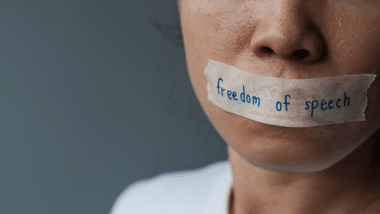Ireland’s hate crime Bill will restrict free speech and criminalise ordinary people for expressing unpopular views, Senator Rónán Mullen has warned.
The Criminal Justice (Incitement to Violence or Hatred and Hate Offences) Bill is set to significantly expand and replace existing hate crime legislation in Ireland. It includes a new offence of inciting hatred against others based on their protected characteristics which carries a possible five-year prison sentence.
Speaking on The Tonight Show, the Independent Senator warned the legislation, currently being considered by the Seanad, is far too broad, and lacks clarity in key areas which could lead to people censoring themselves for fear of prosecution.
Curtailing free speech
Earlier in the show, Justice Minister Helen McEntee committed to enact the legislation this year – more than a year behind schedule. She said that the legislation’s progress had been slowed due to concerns about its impact, which she dismissed as the result of “misinformation”.
She had claimed the Bill would not stifle free speech, but Sen Mullen said it was “remarkable” that in a piece of criminal legislation covering contested areas of ‘hate speech’, the word ‘hatred’ remained undefined.
He said: “People are entitled to clarity, especially in this day and age about what they can say and what they can’t, because there’s a great push on to curtail people’s freedom of expression, particularly around controversial areas, such as gender”.The Government has gone to the extreme end of using criminal law to intimidate ordinary people.
Noting that the Bill says that ‘gender’ includes “other than those of male and female” he highlighted that parents, feminists and people concerned about transgender participation in sport or access to female-only spaces, could be caught by the vagueness of the law.
‘Intimidating ordinary people’
Senator Barry Ward of Fine Gael defended the lack of clarity in the legislation, saying that gender has been defined broadly because its purpose is to protect “people who fall outside that binary condition of being male or female”, and “persecuted minorities”.
He also said “I don’t think anyone is in any doubt about what hate or hatred means”, adding: “Nobody has any doubt about the difference between expressing a legitimate, even offensive, opinion, and the idea that you’re stoking up hatred or seeking to have violence enacted against people.”
But Sen Mullen responded: “You don’t talk about ‘stoking up hatred’ in the Bill. You’re the same as the Minister. She came in and tried to reassure us and said this is about people ‘stirring up’. ‘Stirring up’ was in the 1989 legislation, it’s not in this legislation”.
Although he accepted that the Government had offered reassurance on free speech he concluded “None of the reassurance, none of the safeguards are in the Bill”, adding: “The Government has gone to the extreme end of using criminal law to intimidate ordinary people.”
‘Restrictive, vague, undemocratic’
His comments echoed recent remarks from Barrister Grace Sullivan who told the Irish Independent that the legislation is “restrictive, vague [and] undemocratic”.
She said the lack of definition in the Bill is “problematic”, explaining: “The law itself is what will be applied in the courts and citizens cannot simply rely on assurances from politicians or civil servants.
“The law should be clear in order for citizens to be able to order their conduct in the future to avoid criminal sanction.The Government has gone to the extreme end of using criminal law to intimidate ordinary people.
“What it means to ‘incite hatred’, a seminal aspect of a criminal offence in the Bill, remains inadequately defined and how this law will be interpreted is unclear.”
‘Authoritarian’
Later she told The Christian Institute: “This law will impose criminal limitations on what can be said on certain topics upon which individuals clearly hold differences of opinion, for instance religion.
“Every citizen should care about the restriction through the heavy hand of the criminal law of basic and fundamental human rights that we all enjoy on a daily basis.
“The protections of such rights from government overreach are what separate a democratic society from an authoritarian one. The restriction of my speech today could be the restriction of your speech tomorrow.”
Critics of RoI hate crime Bill forecast ‘free speech big freeze’
Irish Govt claims ‘broad support’ for hate speech Bill despite huge public opposition


